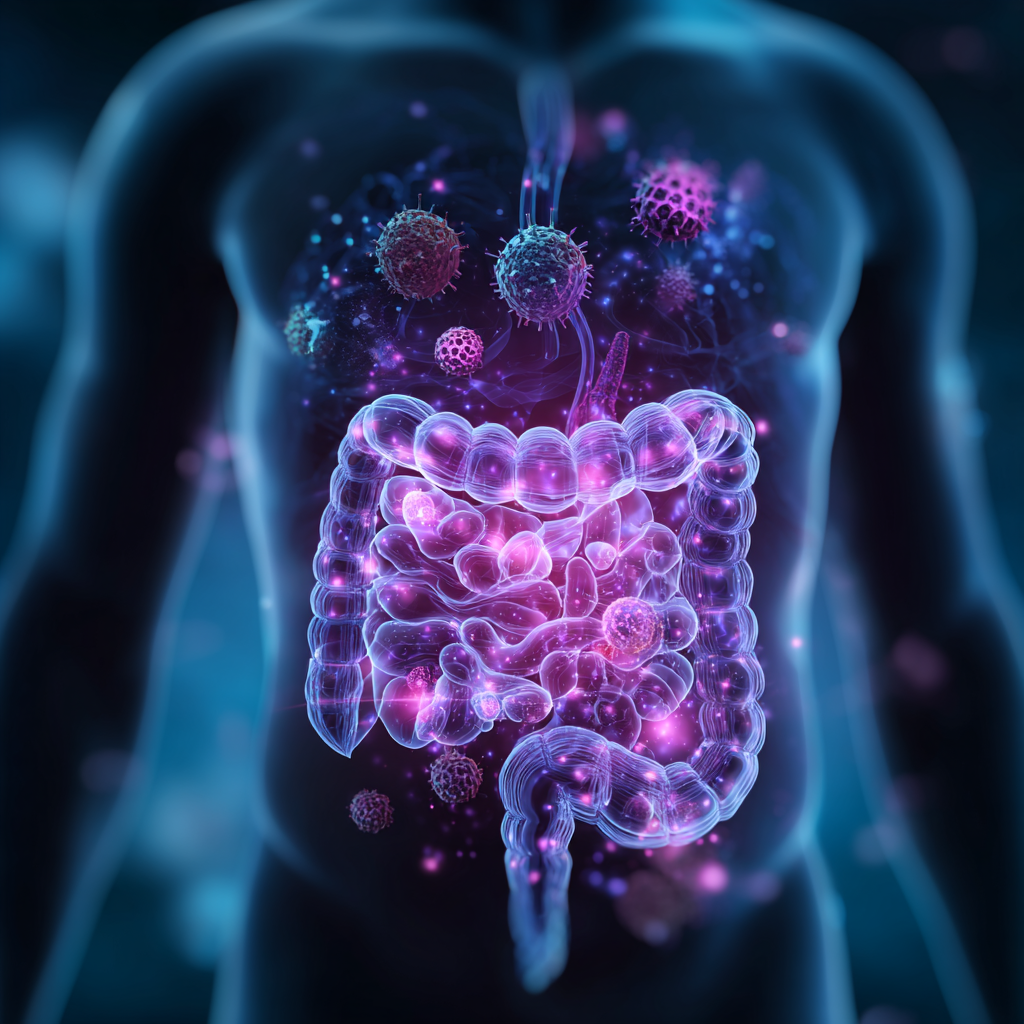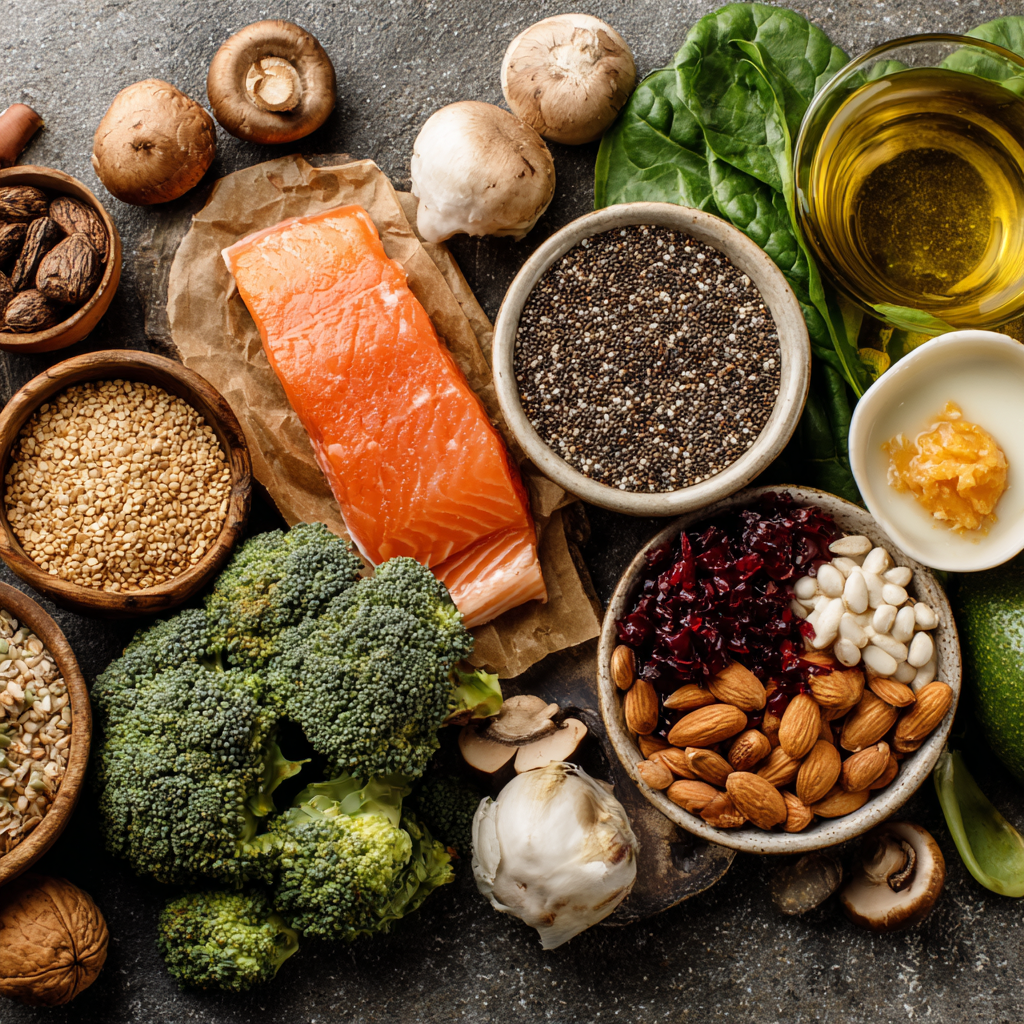Gut Feeling Strong and Probiotics for Active Over 50s: Boost Your Health
For active individuals over 50, maintaining strong gut health is…
For active individuals over 50, maintaining strong gut health is vital. But how can probiotics help? In this blog we’ll explore the science behind gut health, why it becomes more crucial as we age, and how probiotics can make a significant difference. We’ll dive into understanding gut health changes after 50, the benefits of probiotics, and practical ways to incorporate them into your diet. Stick around to learn how to keep your gut feeling strong and support your active lifestyle.
Key Takeaways
- Maintaining gut health in individuals over 50 is crucial as it influences overall well-being, immune function, and digestion, particularly as age-related changes and GI issues become more prevalent.
- Probiotics, particularly through specific strains and dietary sources like fermented foods, can alleviate common gastrointestinal issues, enhance immune responses, and support mental health by influencing neurotransmitter production.
- Consulting healthcare professionals for personalized probiotic selection is essential, as different strains may address unique symptoms and overall gut health needs.
Understanding Gut Health in Your 50s

Our bodies undergo various changes in our 50s, and gut health is one of them. Gut health encompasses:
- Effective digestion
- Absorption of food
- Absence of gastrointestinal (GI) illness
- Stable intestinal microbiota
- Effective immune status
- Overall well-being
The World Health Organization defines gut health as a state of physical and mental well-being without GI tract complaints or bowel function or bowel disease. This intricate system is crucial for our overall human health, influencing everything from nutrient absorption to good gut health, gut function, and immune function.
The human gut microbiome, a vast ecosystem of microorganisms residing in our intestinal tract, plays a significant role in our health. It aids in digestion, supports the immune system and mucosal immune system, and even communicates with our brain and the enteric nervous system. However, as we age, the integrity of our gut barrier can become compromised, leading to an increased risk of infectious, inflammatory, and functional GI diseases, as well as immune-mediated and metabolic disorders, including autoimmune disease and chronic inflammation. Symptoms such as flatulence, bloating, heartburn, constipation, diarrhoea, and abdominal pain are common, but chronic constipation is especially prevalent in older adults. Chronic constipation can indicate underlying issues with gut function, peristalsis, or gut barrier health, and addressing chronic constipation through lifestyle and dietary interventions—such as increased fiber intake, probiotics, and regular physical activity—is important for maintaining gut health. Monitoring bowel movements is also important, as changes in frequency, consistency, or appearance can provide valuable insights into digestive health, hydration, and potential imbalances.
A healthy gut microbiota is crucial since imbalances can lead to various diseases. In the Western world, there is a high prevalence of functional and organic GI diseases, highlighting the importance of understanding and improving gut health and gut flora as we age. The intestinal mucosa plays a key role in immune defence, serving as a barrier and housing immune cells that help protect against pathogens and maintain gut barrier integrity.
The Role of Probiotics for Active Over 50s
Probiotics can be a game-changer for active individuals over 50. Live microorganisms known as probiotic bacteria can counteract age-related changes in the gut microbiota, enhancing overall health and supporting healthy aging. Research shows that probiotic supplementation can positively affect gut microbiota composition in older adults, leading to enhanced digestive health.
The beneficial effects of probiotics on gut health vary based on the specific strains used and the individual’s baseline gut microbiota. Probiotics restore gut balance, alleviating symptoms of common gastrointestinal disorders in older adults. They also enhance immune function, possibly reducing the severity and duration of infections.
Short-chain fatty acids (SCFAs), produced by gut bacteria, play a crucial role in immune regulation and gut health. Incorporating fermented foods like yogurt, kimchi, and kombucha into our diets can be an excellent way to introduce probiotics and enhance both digestion and immune function.
Consuming complex carbohydrates, such as whole grains, beans, and legumes, provides dietary fibre that nourishes beneficial gut bacteria and supports the positive effects of probiotics.
Fermented foods offer flavour and health benefits in various ways:
- Fermented sides like kimchi or pickles at dinner enhance flavour and provide beneficial probiotics.
- Snacking on fermented foods like pickles or cheese offers flavour and health benefits.
- Making sauerkraut or yogurt at home provides personalized and cost-effective probiotic sources.
Understanding Gut Microbiota
The human gut microbiota is a bustling community of trillions of microorganisms—including bacteria, viruses, and fungi—that live throughout your gastrointestinal (GI) tract. Far from being just passive residents, these microbes play a vital role in maintaining gut health, supporting the immune system, and even helping to produce essential vitamins. A balanced gut microbiota is key to optimal gut function, but as we age, this balance can be disrupted. The intestinal mucosa acts as a frontline of immune defence. Additionally, the gut-associated lymphoid tissue (GALT) is a key component of the immune system within the gut, interacting with the microbiota to regulate immune responses and defend against pathogens.
Factors such as antibiotic exposure, chronic stress, and an unhealthy diet can throw the gut microbiota out of sync, a state known as dysbiosis. When this happens, the risk of developing conditions like irritable bowel syndrome (IBS), inflammatory bowel disease (IBD), and even autoimmune diseases increases. Dysbiosis can impair gut function, weaken the immune system, and make the GI tract more susceptible to inflammation and infection. For active individuals over 50, maintaining a healthy gut microbiota is crucial for reducing the increased risk of chronic diseases and supporting overall well-being.
Choosing the Right Probiotic
Choosing the right probiotic is crucial for reaping the benefits of these beneficial bacteria. Consult healthcare professionals before starting any probiotic regimen to ensure it suits your specific health needs. Probiotics must be generally recognized as safe and supported by favourable clinical evidence to be considered for effective use.
Choosing the right probiotic depends on the specific gastrointestinal symptoms to be addressed. Different probiotic strains have varied effects on gut microbiota and overall health. Understanding your unique gut health needs and consulting a healthcare provider helps in choosing the most appropriate probiotic.
Eating fermented foods in addition to supplements can naturally improve gut health. Yogurt, kefir, sauerkraut, and kimchi are rich in probiotics and support a healthy gut microbiome.
Importance of Fermented Foods
Fermented foods do more than just add flavour to your meals—they’re rich in nutrients, including vitamins and minerals, and contain antimicrobial peptides that help protect against pathogenic bacteria. Incorporating fermented foods into your normal diet is a simple and effective way to improve gut health, enhance immune function, and promote overall well-being. Whether you enjoy them as a snack or as part of a meal, fermented foods are a tasty way to support your digestive system and keep your gut microbiota thriving.
Benefits of Probiotics on Physical Health

Probiotics offer a myriad of benefits for physical health, particularly for those of us over 50. They may:
- Alleviate IBS symptoms like bloating and discomfort in IBS patients.
- Restore gut microbiota balance, essential for managing IBS treatment.
- Enhance the gut’s barrier function, potentially reducing intestinal permeability in IBS individuals.
Probiotics may provide several health benefits:
- Reduce gut inflammation, which is beneficial for those at risk of inflammatory bowel disease.
- Help older adults with a varied gut microbiome tend to have lower cholesterol and better physical performance.
- Improve energy levels and support better weight management. Imbalances in gut microbiota and diets low in fibre can contribute to unwanted weight gain, while supporting gut health with fibre-rich foods may help prevent this.
Gut microbiota significantly impacts healthy aging and longevity, with diverse microbiomes linked to better health outcomes. Certain probiotic strains can modulate immune responses in the gastrointestinal tract.
Probiotics and Mental Health

The connection between gut and mental health is profound, with probiotics playing a pivotal role. Research shows that gut bacteria produce neurotransmitters crucial for brain function and development, influencing the central nervous system. Studies suggest that probiotics may influence cognitive functions by altering levels of neurotransmitters such as serotonin and dopamine.
Probiotics have been linked to improvements in well-being and cognitive function in older adults. Probiotic intake enhances cognitive performance by increasing brain-derived neurotrophic factor (BDNF) expression. Probiotics have also been linked to improved neuroplasticity and modulation of HPA axis dysfunction. Additionally, probiotics can modulate the body’s stress response, supporting both mental and gut health.
Certain probiotics can restore healthy gut microbiota, potentially alleviating symptoms of anxiety and depression. Research also links gut inflammation and microbiota imbalances to depressive symptoms in older adults. The gut-brain axis, a communication pathway between the gut and brain, plays a crucial role in mental health. Psychological stress can negatively impact gut health, but probiotics may help mitigate these effects. Maintaining a healthy gut microbiome supports better mental health and overall quality of life. While current studies are promising, more research is needed to fully understand the mechanisms and long-term benefits of probiotics on mental health in older adults.
Role of Probiotics in Gut Barrier Function
A strong gut barrier is essential for keeping your digestive system healthy and preventing issues like leaky gut. Probiotics—live microorganisms found in fermented foods and supplements—play a key role in maintaining this barrier. They help by increasing mucus secretion, which protects the gut lining, and by improving intestinal permeability, making it harder for harmful substances to pass through.
Probiotics also help regulate inflammation and prevent the overgrowth of pathogenic bacteria, which can otherwise disrupt gut motility and trigger IBS symptoms. By enhancing gut barrier function and supporting the mucosal immune system, probiotics help keep your digestive tract resilient and reduce the risk of chronic diseases. Including probiotic-rich fermented foods or supplements in your routine is a smart way to support gut health and maintain a strong, healthy gut barrier.
Incorporating Probiotics into Your Diet
Adding probiotics to your diet can be delicious and straightforward. Begin your day with gut-friendly foods like kefir or yogurt for a tasty source of probiotics. Naturally fermented sourdough bread is easier to digest and makes an excellent breakfast option.
Incorporate fermented foods like sauerkraut on sandwiches or miso in salad dressings throughout the day to enhance your meals with probiotics. Fermented foods naturally provide probiotics and support digestion and digestive enzymes nutrient absorption.
Snacking on fermented foods or adding them to meals can significantly improve gut health and well-being.
For individuals with persistent digestive symptoms, considering an elimination diet or a low FODMAP diet under professional guidance may help identify food triggers and support overall gut health.
Lifestyle Tips for Maintaining Gut Health
Gut health maintenance requires a holistic approach beyond diet. Supporting gut health benefits the whole body, not just digestion. Key factors include:
- A fibre-rich diet supports the growth of beneficial gut microbes.
- Avoiding smoking and consuming probiotics positively impacts gut microbiome health.
- Staying hydrated is crucial for digestive health, especially in older adults since dehydration can exacerbate gut problems.
Factors that enhance gut health include:
- Regular physical activity, which enhances gut microbiota diversity and aids in digestion.
- Stress management through exercise and relaxation techniques.
- Adequate sleep, as lack of sleep can negatively impact the gut microbiome and cause discomfort.
- Addressing hormone imbalance through lifestyle and diet can also benefit gut health.
Some individuals also explore alternative medicine approaches, such as abdominal massage or natural therapies, as part of a holistic gut health strategy.
Addressing Common Gut Issues After 50
Aging brings specific gut issues. Acid reflux instances increase due to age-related changes in oesophageal function and gastric acid production. Food intolerances, particularly to lactose and gluten, often develop with age, causing gastrointestinal discomfort. Food allergy is another immune-related condition that can cause digestive symptoms and may be influenced by gut health.
Leaky gut syndrome, though controversial, is suggested to be associated with various gastrointestinal symptoms in aging, including bloating and abdominal pain, such symptoms can be alleviated by probiotics that address digestive issues like constipation, common in older populations. Inflammatory bowel diseases such as ulcerative colitis and Crohn’s disease can also present with similar symptoms and require medical management.
Practices like eating slowly, chewing thoroughly, and staying hydrated can mitigate digestive discomfort. Dietary changes like reducing irritants and increasing fibre can also help.
Managing Irritable Bowel Syndrome
Irritable bowel syndrome (IBS) is a common challenge for many people over 50, often marked by recurring abdominal pain, bloating, and unpredictable changes in bowel movements. The root of IBS symptoms often lies in the delicate balance of your gut microbiota. When the community of gut bacteria is disrupted, it can trigger or worsen IBS symptoms, making daily life uncomfortable.
To help manage irritable bowel syndrome, focus on strategies that support and improve gut health. Incorporating fermented foods like yogurt and kefir into your diet can encourage the growth of beneficial gut bacteria, which may help ease abdominal pain and regulate bowel movements. These foods are natural sources of probiotic bacteria that work to restore balance in your gut microbiota.
Beyond diet, it’s important to identify and avoid personal trigger foods that may worsen IBS symptoms. Managing stress through relaxation techniques and regular physical activity can also make a significant difference, as stress is known to impact gut health and IBS flare-ups. For some, probiotic supplements containing specific strains of probiotic bacteria can further help reduce IBS symptoms and improve overall gut health.
If you’re struggling with IBS, work closely with a healthcare professional to develop a personalized plan. With the right approach, you can take control of your gut health and minimize the impact of IBS on your daily life.
The Impact of Chronic Stress on Gut Health
Chronic stress doesn’t just affect your mood—it can have a profound impact on your gut health as well. When you’re under ongoing stress, your body releases hormones like cortisol, which can disrupt the balance of your gut microbiota. This imbalance may lead to an overgrowth of pathogenic bacteria and a reduction in beneficial gut bacteria, setting the stage for digestive discomfort.
The effects of chronic stress on the gut can include abdominal pain, bloating, and irregular bowel movements. Over time, stress can also increase intestinal permeability, sometimes referred to as leaky gut. This means the gut wall becomes less effective at keeping out unwanted substances, allowing toxins and undigested food particles to enter the bloodstream. The result is an immune response that can trigger inflammation and may even contribute to the development of autoimmune diseases.
To protect your gut health from the negative effects of chronic stress, it’s important to adopt stress management techniques. Practices like meditation, deep breathing, and regular exercise can help calm the body’s stress response and support a healthier gut environment. By taking steps to manage stress, you can help maintain a balanced gut microbiota, reduce abdominal pain, and keep your digestive system functioning smoothly.
Immune Response and Probiotics
Your immune system and gut health are closely connected, and probiotics can play a powerful role in keeping both in top shape. Probiotics interact with immune cells like dendritic cells and mast cells to help regulate the immune response and prevent unnecessary inflammation. They also stimulate the production of antimicrobial peptides, such as defensins, which help protect your gut from pathogenic bacteria.
By reducing chronic inflammation—a common issue in conditions like IBS, IBD, and autoimmune diseases—probiotics support good gut health and overall immune function. A healthy gut microbiota is essential for a strong immune system, and probiotics help maintain this balance by supporting immune cells and enhancing the body’s natural defences. For active over-50s, incorporating probiotics into your diet is an effective way to boost immune response, reduce the risk of chronic diseases, and promote long-term health.
The health care system also plays a vital role in supporting immune health for older adults, especially by integrating holistic and preventive approaches to wellness.
Taking Control of Gut Health: Action Steps for Over 50s
As we age, supporting gut health becomes even more important to reduce the increased risk of chronic conditions like inflammatory bowel disease and autoimmune disorders. Fortunately, there are practical steps you can take to keep your gut—and your whole body—feeling its best.
Start by focusing on a balanced diet rich in whole, natural foods. Fruits, vegetables, and whole grains provide the fiber and nutrients that beneficial gut bacteria need to thrive. Adding fermented foods such as sauerkraut and kimchi to your meals can further boost the diversity of your gut microbiota, thanks to their natural supply of probiotic bacteria.
Staying hydrated, engaging in regular exercise, and managing stress are all key habits that support gut health. Consider incorporating a high-quality probiotic supplement, especially one with multiple strains of probiotic bacteria, to further enhance your gut’s resilience.
It’s also wise to limit foods that can trigger inflammation, such as highly processed or sugary items, and to prioritize getting enough restful sleep. By making these action steps part of your daily routine, you can help protect your gut health, lower your risk of inflammatory bowel disease, and enjoy a higher quality of life as you age.
Summary
Maintaining good gut health is crucial for overall well-being, particularly for those of us over 50. Probiotics play a significant role in supporting a healthy gut microbiome, which in turn enhances physical and mental health. By choosing the right probiotics, incorporating them into our diets, and adopting a holistic approach to gut health, we can improve our quality of life and feel stronger every day.
Remember, your gut is the gateway to your overall health. Take the steps to nurture it, and you’ll reap the rewards of a healthier, more vibrant life.
Frequently Asked Questions
What are probiotics, and how do they help with gut health?
Probiotics are live microorganisms that promote gut health by maintaining a balanced microbiota, improving digestion, and supporting immune function. Incorporating probiotics into your diet can enhance your overall well-being.
How can I incorporate probiotics into my diet?
To effectively incorporate probiotics into your diet, consider starting your day with kefir or yogurt, adding sauerkraut to meals, and using miso in salad dressings. Additionally, include other fermented foods such as kimchi, kombucha, and sourdough bread for a diverse range of probiotics.
Are there specific probiotics recommended for older adults?
It is essential for older adults to consult a healthcare professional to identify the most suitable probiotic strain based on their individual health needs and symptoms. This personalized approach ensures optimal digestive health.
Can probiotics improve mental health?
Probiotics have been shown to positively influence mental health by producing neurotransmitters and modulating the gut-brain axis, potentially leading to improvements in anxiety, depression, and cognitive performance. Therefore, incorporating probiotics may be beneficial for enhancing mental well-being.
What lifestyle changes can support gut health?
To support gut health, it is essential to maintain a fibre-rich diet, stay hydrated, engage in regular physical activity, manage stress effectively, and ensure adequate sleep. These lifestyle changes collectively promote optimal digestive function.






